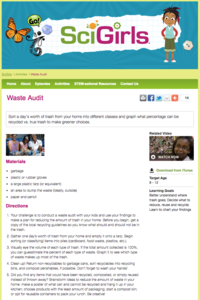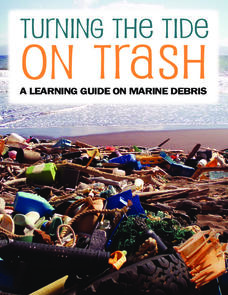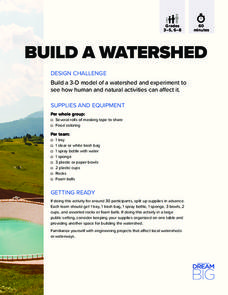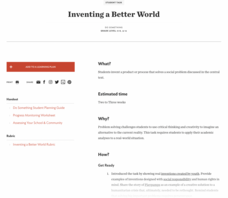Curated OER
The Trash We Pass
Where does our garbage go? What is the difference between a recyclable and non-recyclable item? Pose these important, but often overlooked, questions to your class and invite them to consider the lasting and damaging effects of the...
Curated OER
The Zabbaleen, Cairo's Garbage Workers
Here is a fascinating human geography study of the Zabbaleen. They are a sub-class of people who work as garbage collectors in Cairo, Egypt. I can't say enough good things about this resource in my limited space here. It is fabulous! If...
PBS
Waste Audit
Does everything in the trash can belong there? Conduct a waste audit with your class by collecting a day's worth of garbage, separating it into recyclables, non-recyclables, or food waste, and properly distributing what they find into...
Curated OER
Litter Crusade
Litter, garbage, and pollution are all addressed in a nice lesson on waste and recycling. Learners discuss what litter is and how it affects the environment. Then, they sing a song about eliminating litter before going out on campus to...
PricewaterhouseCoopers
Waste and Recycling: Recycling and Energy Recovery
Reduce, reuse, recycle, and recover. Young environmentalists learn about the overwhelming amount of garbage produced and discover better ways to minimize their impact on Earth by learning the difference between garbage and recyclables.
Core Knowledge Foundation
Taking Care of the Earth Tell It Again!™ Read-Aloud Anthology
A read-aloud anthology closely examines human impact on the Earth while boosting reading comprehension skills. Through stories, scholars examine the concepts of natural resources, pollution, garbage, and recycling and brainstorm ways to...
NOAA
Turning the Tide on Trash: A Learning Guide on Marine Debris
The lessons in this learning guide are designed to increase youngsters' awareness of the impacts of marine debris and to teach them about pollution prevention techniques. This fabulous, 30-page packet is chock full of important...
PBS
What We Do Adds Up
With so many tons of trash going into landfills each year, your environmentalists can calculate how much the average person is tossing away. This activity has a series of questions not only requiring math, but a conscious thought of how...
Berkshire Museum
Reduce, Reuse, and Recycle: Sorting Through Personal Choices
Raise children's awareness about the importance of conservation with this hands-on science lesson. Start by breaking the class into groups and having them collect trash from around the school or local park. Students then use the provided...
Curated OER
Turning the Tide on Trash: Marine Debris Curriculum
Seven pages of fascinating reading on marine debris preface the activities in this lesson plan. Four different activities are employed to simulate how the debris is distributed in the ocean and along beaches. Early ecology learners...
Curated OER
Re-Presenting Race in the Digital Age
Teen-aged scientists analyze a graphic organizer of how trash is removed from New York City and then answer standard questions about a graph and a diagram. Resources are mentioned, but there are no links to these resources, so you will...
PBS
Going Green
Trash is where it's at! Using bags of garbage collected from the school, learners sort the contents into categories based on type of material and collect data on the results. The data may include weight, volume, and/or percent of the trash.
Curated OER
Turning the Tide on Trash: Marine Debris Curriculum
Six different lessons comprise this unit on marine debris. Science, language arts, social studies, and art projects make this an ideal interdisciplinary unit. The result will be well-informed future citizens who can help make a...
DiscoverE
Build a Watershed
What's the best way to learn how watersheds work? Build one! Combining engineering, the water cycle, and ecology concerns, the activity is the perfect fit for an interdisciplinary unit. Teams construct a model watershed with simple...
United Nations
Compost Monitor Training
What should go in the trash, and what can be composted? Guide your young conservationists through the process of composing their trash with a lesson about the different ways we can dispose of garbage. Using a trash bag with clean...
Curated OER
Pollution
Young ecologists investigate some of the many ways that human activities adversely affect the environment. After identifying the main types of pollution (air, water, soil), 3rd graders fill in a Venn Diagram by pasting cut-out pictures...
US Environmental Protection Agency
Non-Point Source Pollution
Investigate the different types of pollution that storm drain runoff carries into oceans, lakes, rivers, and streams with this class demonstration. Using an aquarium and an assortment of everyday items that contaminants like motor oil,...
Bonneville
Design and Engineer Solutions
What's the best way to collect all that trash? A culminating activity has scholars use the knowledge and skills from the unit to design a solution to the plastic trash island problem. They use 3-D pens or a 3-D printer to build models of...
British Council
Buy. Use. Toss.
Responsible consumption is never a waste of time. Using the engaging resource, scholars learn about the impact of waste on the planet, sorting trash into necessary and luxury piles. They then analyze their consumption habits, writing an...
Wilderness Classroom
Pollution
Educate scholars on pollution—air, water, and land—with a series of lessons that begin with a thorough explanation of each type. Learners then take part in three activities to reinforce the importance of reducing pollution. They...
National Wildlife Federation
Plastic in the Sea
How much plastic do people use? Class members identify how plastic is involved in their daily lives by looking at food packaging either at a grocery store or at home. Learners view statistics for the amount of plastics found on a beach...
PJ Library
Joseph Had a Little Overcoat
Teach children that just because something is old, doesn't mean you have to throw it away with a reading of Joseph Had a Little Overcoat by Simms Taback. Engaging children with an arts and crafts activity in which they patch the holes in...
Teaching Tolerance
Inventing a Better World
From play pumps that provide clean water to shoes made from trash, innovators change the world one invention at a time. After researching various inventions, young entrepreneurs develop their own. Extension opportunities include prompts...
Curated OER
Marine Debris
Now is the time to educate tomorrow's citizens to care for the planet, and here is a lesson to help facilitate the process. Collect some marine debris and bring it into class. Have your class separate it into types and then test each...
Other popular searches
- Garbage Disposal
- Garbage and Recycling
- Garbage Collector
- Pollution Garbage
- Trash and Garbage
- Garbage Words
- Garbage and Water
- Garbage Barge
- Garbage Dump
- History of Garbage Disposal
- Garbage Lesson
- Garbage Men

























